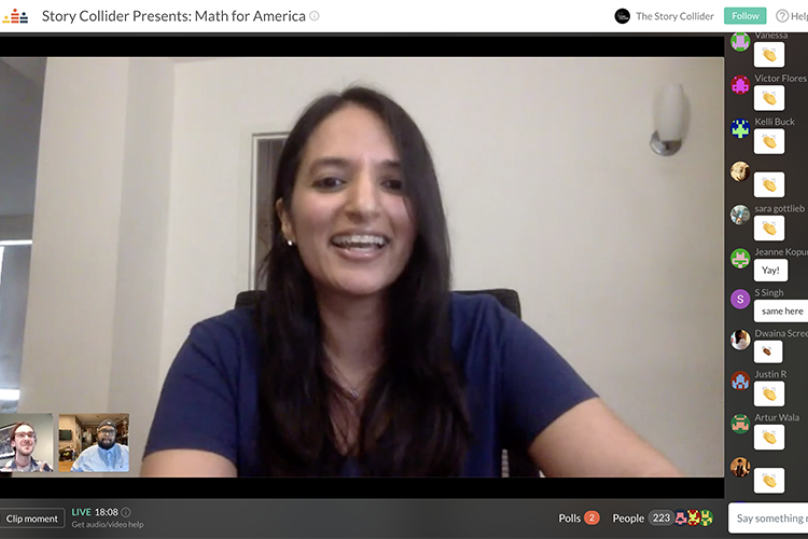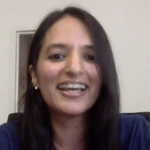
By Soni Midha, MƒA Master Teacher
This piece is an adaptation of the talk Soni gave at the annual MƒA Thursday Think event with the Story Collider in spring 2020.
Growing up, I was always good at math. I’d spend hours solving puzzles or playing math games. In school, math classes were usually a breeze, and though there were moments of confusion, I rarely struggled with the concepts being taught. I felt the same sense of ease when I started teaching. I taught Math A my first year, and while the lesson planning, grading, handling of classroom management, and juggling of work and life kept me up every single night, the actual content I was teaching was never an issue. I had a deep understanding of the concepts, and I held a confidence that allowed my students to trust me; they knew that I had their best interests in mind and that I wanted nothing more than for them to grow and learn to become confident in their math skills.
It was not until my tenth - yes, tenth - year of teaching, that I began to question my own math ability for the first time. I had just switched from teaching Geometry to teaching Calculus and Pre-Calculus. I was really excited about this switch, and I dedicated that summer to reviewing and relearning the entire Calculus curriculum. I felt pretty good about the content when school started in September. Or so I thought.
After about three weeks back at school, I was teaching my students about the limit definition of derivatives. I realized that, while I easily knew the definition and how to apply it, I didn’t understand the meaning and derivation deep enough to be able to teach it with authority to my students in a way that made sense. Teachers have to know more than how to get the right answers; we truly have to understand the concept and the “why.”
That feeling terrified me. It made me doubt myself and my ability to teach math, the subject that I love and my area of expertise. That day, and many days after during that school year, I had an insecure sense of feeling stuck. I stopped thinking of myself as a good teacher because I wasn’t sure I could answer every single one of my students’ questions anymore. And I hated that feeling, especially when my kids were confused. I can’t do this anymore, I remember thinking. That feeling of dread made me not want to go to school on some days. But I had no choice, because it was my job, and I couldn’t let my kids down. So what happens when an already established math teacher suddenly loses her confidence? What happens when the expert is doubting herself?
Teachers have to know more than how to get the right answers; we truly have to understand the concept and the “why.”
I didn’t have a coach that year to guide me, so I figured it out myself. Google became my best friend. I reached out to the teacher who previously taught the class at my school, as well as other MƒA teachers who taught Calculus, and asked for tips and ideas. In addition to graciously sharing their own lessons and curriculum with me, they directed me to dozens of websites and PD opportunities (most being either at or through MƒA) that could help me with my own class. It was an eye opening experience, and reminded me how important it is to have a professional community like MƒA to turn to. Like our own students who seek out help from their peers, all teachers need a community - a network - to work with and talk through ideas and issues we face in our profession. I don’t think I could have successfully made it through the year without my MƒA colleagues.
That year also gave me insight into how my own students, particularly those who have struggled in math over the years, must have felt. Like me, they probably felt a sense of dread walking into my class and didn’t want to come to class on some days. This experience made me think about how we as teachers can alleviate that feeling and create an environment which celebrates struggle and encourages growth and collaboration.
Due to the pandemic, so many of us are now facing a similar sense of dread and insecurity. We no longer feel like the expert - because we are unsure of how to effectively engage our students in a virtual world, or because we are trying to rapidly learn and implement so much new technology, or because our students are facing challenges that seem insurmountable.
When those feelings arise, it’s important to remember that none of us are perfect. And that’s okay. None of us know everything about how to teach in this new environment, and that’s also okay. We are all a work in progress, and what matters is getting better. This coming school year is going to be filled with new challenges for teachers, which will push our limits and push us out of our comfort zones. Because of this, it is more important than ever for us to work together and to be there for each other. Much like how I leaned on MƒA, both professionally and intellectually, to overcome a challenging situation, we must all seek support in our various professional communities and help one another. This work is hard because we all care deeply about our students’ learning and want to provide them with the best experience possible. And just like we did this past spring, we will get through this. With one another’s support and encouragement, we can get even better.
